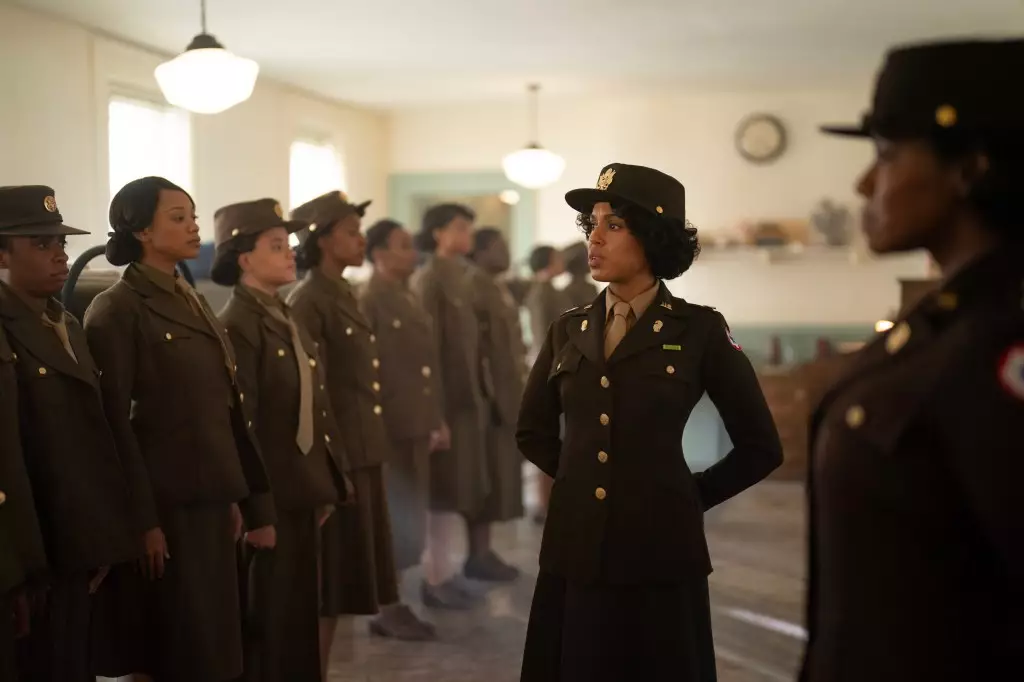Tyler Perry’s latest film, *The Six Triple Eight*, casts an illuminating spotlight on a remarkable yet largely overlooked segment of World War II history—the Women’s Army Corps Unit of Color. Scheduled to be released on Netflix on December 20, 2024, the film tells the inspiring story of the 6888th Central Postal Directory Battalion, composed primarily of over 855 Black women who faced insurmountable adversity while serving their country. Unlike many other war films that center around the male experience, this poignant narrative highlights the tenacity of these women as they rose above the rampant racism and sexism of their time to perform a critical task essential to military morale.
When discussing war, it is often common for audiences to refer to the common images of heroism portrayed through epic battles and grand strategies. Perry deftly counters this typically narrow lens by venturing into the intimate struggles and achievements of women whose contributions have gone unrecognized for far too long. Similar in spirit to the acclaimed film *Hidden Figures*, which revealed the pivotal roles women of color played in America’s space race, *The Six Triple Eight* aims to reclaim a piece of history that, until now, has suffered from systemic erasure.
What differentiates Perry’s film is the emphasis on emotional depth and personal stories that humanize the historical context. At the crux of the narrative is Major Charity Adams, portrayed by Kerry Washington. Adams finds herself significantly challenged, not only by the nature of her assignment but by the prejudiced attitudes of those in command. The portrayal of her character encapsulates the dual struggle faced by women of color during the war—a battle against both enemy forces overseas and the discriminatory systems that sought to belittle their contributions at home.
The film captures the magnitude of the task that lay before the 6888th: handling a staggering 17 million pieces of mail intended for soldiers on the frontlines, often rendered nearly unreadable due to neglect. The phrase “No Mail, No Morale” resonates throughout the film, epitomizing the significance of their mission. With communication being limited to written correspondence, these women played a crucial role in maintaining the spirits of soldiers and their families back home, underscoring their contributions to the war effort and the emotional landscape of wartime experience.
*The Six Triple Eight* does not shy away from illustrating the harsh realities faced by the battalion. From navigating treacherous ocean waters en route to Europe to confronting the condescending attitudes of male superiors, the film balances moments of heartfelt determination with sobering instances of gender and racial discrimination. Notably, the character of General Halt, played by Dean Norris, represents the antagonistic forces that Adams and her battalion courageously combat—not through a traditional military engagement but through sheer resolve and unyielding dedication.
Perry chooses to develop a diverse lineup of characters within the 6888th, adding richness to the narrative. Their distinct personalities and battles bring life and relatability to their collective story, thereby ensuring viewers connect with their struggles on a personal level. Alongside Major Adams, we meet characters like Lena Denniecott King and Captain Campbell, whose relationships reflect the broader social fabric of the time, intertwined with the challenges of war.
Perry’s direction shines as he carefully navigates the space between historical accuracy and cinematic artistry. The film’s production elements, from costume design by Karyn Wagner to the evocative score by Aaron Zigman, transport viewers to 1940s America and Europe. Additionally, the use of actual photographs in the closing credits provides a poignant reminder of the real women whose stories inspired this cinematic narrative.
Ultimately, *The Six Triple Eight* serves as a powerful reminder not only of the resilience of the battalion but also of the broader societal changes that have gradually unfolded since that era. It opens a dialogue about recognition for women in uniform and offers a crucial lesson for contemporary audiences about the role of marginalized communities in shaping historical narratives.
In an era defined by social justice movements, Perry’s film stands as more than an entertaining story—it is a clarion call to honor and celebrate those who have long worked behind the scenes but nevertheless have played an invaluable role in the fabric of history. With its release around the holidays, *The Six Triple Eight* promises to resonate deeply, inviting reflection on the sacrifices made by women who have served in the shadows, their contributions finally stepping into the light.



Leave a Reply